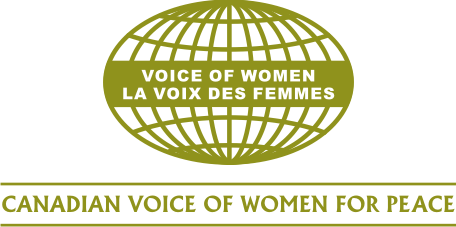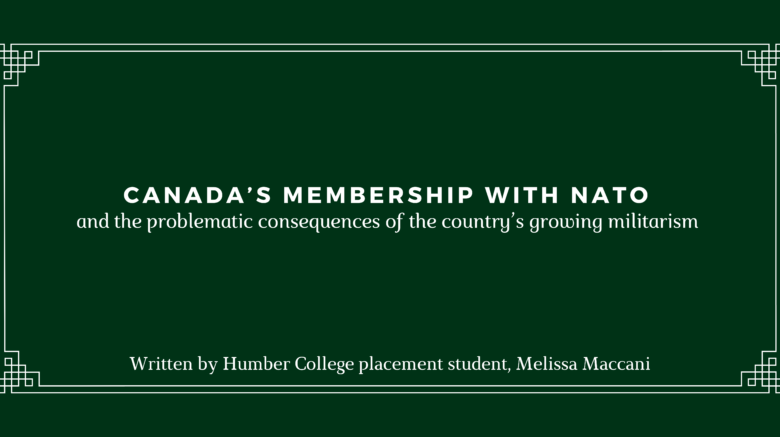In the past year, Canada has faced numerous challenges, a deadly pandemic with mutating variants, vaccinations, an unnecessary federal election, various natural disasters, and protests in defence of Indigenous land. However, considering the militarization of the RCMP in British Colombia, the recent events in Afghanistan—of which the Canadian Armed Forces played a heavy hand—and the federal government’s plan to purchase 88 new fuel-intensive fighter jets; a conversation needs to be had of Canada’s growing militarism, its membership with NATO, and the problematic consequences of it.
The North Atlantic Treaty Organization (NATO) is a military alliance initially founded by twelve western countries—including Canada—in 1949 for the purpose of collective security against the Soviet Union. Though despite the collapse of the Soviet Union in 1991, NATO has since grown to include 14 additional countries, with 4 more pending in 2021.
How does this affect Canada’s militarism?
Well, membership—as of 2006—comes with the expectation that 2% of a nation’s gross domestic product (GDP) be put towards its defence budget, and that 20% of that 2% is then relegated towards weaponry. To put this into perspective, Canada’s GDP in 2020 was $1.643 trillion, and 2% of that is $32 billion. Officially, from 2020-2021, the federal government’s defence budget was $23.3 billion, and though not quite hitting the required 2%, still an exorbitant amount compared to the budget for Environment and Climate Change that was $17.6 billion over 5-7 years.
This financial obligation is one of the problematic consequences of Canada’s growing militarism.
While Canadians are being penalized for accepting CERB payments, despite being eligible, during the pandemic, many are being forced to pay the money back (Melnychuk, 2021); while provincial governments cut funding for health, social services, and education; while the housing market across provinces has reached unsustainable levels, the financial drain that membership with NATO imposes is quickly becoming a detriment to average Canadians.
Another problematic consequence is the morality of it. With Canada’s growing militarism, there is perceived self-importance that comes with authoritative power, often resulting in abuse of that power, especially in the event of “othering”. Othering is a phenomenon in which a person or group of people are viewed and treated as different or alien to oneself, this eventually allows a perpetrator the perceived moral high ground in the mistreatment of that person or group of people.
This can be seen domestically, as an example—as previously mentioned—the treatment of Wet’suwet’en land defenders by a militarized RCMP; and internationally with instances of war crimes committed against civilians by Canadian soldiers during the military occupation in Afghanistan (Icfi, 2020).
Additionally, despite NATO’s anti-trafficking policy, sexual violence and forced prostitution of women and girls in countries with active operations, both peacekeeping and in times of conflict is—by UN definition—considered a war crime. An example of this is the deployment of UN and NATO missions to Bosnia-Herzegovina and Kosovo in the 90s, which resulted in the Balkans becoming a major destination for trafficked women from Eastern Europe (Herbert, 2011).
With Canada’s support from NATO in their military expenditure, a global network of military bases is being established. With current locations in Jamaica, Senegal, Germany, and Kuwait; and future potential bases in Tanzania, Singapore, and South Korea (Lukacs, 2021). This act to perpetuate a more aggressive foreign policy, almost mirroring the U.S, just increases the risk of war crimes being committed once “othering” comes into effect.
Of course, there are many other consequences that should be considered such as environmental impact, how militarism affects immigration, and how that immigration ultimately affects indigenous sovereignty and the treaties with the First Nations people, and all are equally important in the conversation of Canada’s militarization.
Despite the actions and decisions of the federal government, Canada is seen as a peacekeeping nation; and it’s a wonder of how much longer until that perception shifts to truly reflect the violence that this country increasingly perpetuates with every year that passes.
A conversation must be had if Canada ever hopes to change that trajectory, if it hopes to retain the peacekeeping label, and if it intends to do right by its citizens.
By Melissa Maccani
Sources
Government of Canada. (2021) Defence Budget. Retrieved from the Government of Canada website. https://www.canada.ca/en/department-national-defence/corporate/reports-publications/transition-materials/defence-101/2021/05/dma-transition-march-2021/defence-budget.html#shr-pg0
Government of Canada. (2021) Budget 2021 A Healthy Environment for a Healthy Economy. Retrieved from the Government of Canada website. https://www.canada.ca/en/department-finance/news/2021/04/budget-2021-a-healthy-environment-for-a-healthy-economy.html
Herbert, L. (2011). Analyzing UN and NATO Responses to Sexual Misconduct in Peacekeeping Operations. Making Gender, Making War Violence, Military and Peacekeeping Practices, 107–120. https://www.researchgate.net/profile/Annica-Kronsell/publication/262344366_Kronsell_Annica_and_Erica_Svedberg_eds_2011_Making_Gender_Making_War_violence_military_and_peacekeeping_practices_London_and_New_York_Routledge/links/5b3f83cfa6fdcc85060275de/Kronsell-Annica-and-Erica-Svedberg-eds-2011-Making-Gender-Making-War-violence-military-and-peacekeeping-practices-London-and-New-York-Routledge.pdf#page=121
Icfi, T. (2020, December 12). Canada’s military seeks to cover its tracks following damning report on Australian war crimes in Afghanistan. World Socialist Web Site. Retrieved December 18, 2021, from https://www.wsws.org/en/articles/2020/12/12/caaf-d12.html
Lorincz, T. (2021, May 1). The Saturday Debate: Should Canada leave NATO? Thestar.Com. Retrieved December 18, 2021, from https://www.thestar.com/opinion/contributors/the-saturday-debate/2021/05/01/the-saturday-debate-should-canada-leave-nato.html
Lukacs, M. (2021, June 29). Canada building global network of military bases in aggressive shift. The Breach. Retrieved December 19, 2021, from https://breachmedia.ca/canada-building-global-network-of-military-bases-in-aggressive-shift/
Melnychuk, M. (2021, December 1). Regina couple ordered to pay back $12,000 in CERB benefits. Leaderpost. Retrieved December 18, 2021, from https://leaderpost.com/news/local-news/regina-couple-ordered-to-pay-back-12000-in-cerb-benefits
North Atlantic Treaty Organization. (n.d.). Funding. NATO. Retrieved December 20, 2021, from https://www.nato.int/cps/en/natohq/topics_67655.htm
United Nations. (n.d.). United Nations Office on Genocide Prevention and the Responsibility to Protect. Retrieved December 19, 2021, from https://www.un.org/en/genocideprevention/war-crimes.shtml
Wheeler, S. (2020, October 28). UN Peacekeeping has a Sexual Abuse Problem. Human Rights Watch. Retrieved December 20, 2021, from https://www.hrw.org/news/2020/01/11/un-peacekeeping-has-sexual-abuse-problem

